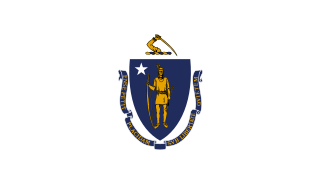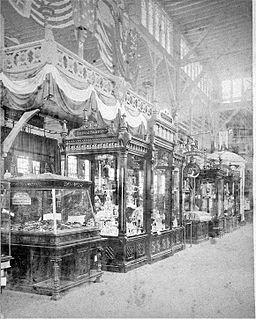
William Lloyd Garrison was a prominent American abolitionist, journalist, suffragist, and social reformer. He is best known as the editor of the abolitionist newspaper The Liberator, which he founded with Isaac Knapp in 1831 and published in Massachusetts until slavery was abolished by Constitutional amendment after the American Civil War. He was one of the founders of the American Anti-Slavery Society, and promoted "immediate emancipation" of slaves in the United States.

Wendell Phillips was an American abolitionist, advocate for Native Americans, orator, and attorney.

John Reynolds was a United States politician from the state of Illinois. He was one of the original four justices of the Illinois Supreme Court, 1818–1825, a member of the Illinois House of Representatives from 1826–1830, 1846–1848, and 1852–1854, and the 4th Illinois Governor from 1830–1834. He also represented Illinois in the United States House of Representatives, 1834–1837 and 1839–1843.

Gerrit Smith was a leading United States social reformer, abolitionist, politician, and philanthropist. Spouse to Ann Carroll Fitzhugh, Smith was a candidate for President of the United States in 1848, 1856, and 1860, but only served 18 months in the federal government—in Congress as a Free Soil Party Representative, in 1853–4.
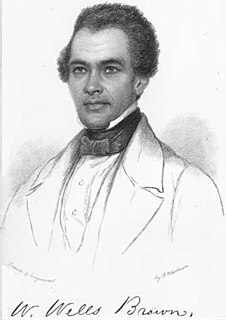
William Wells Brown was a prominent African-American abolitionist lecturer, novelist, playwright, and historian in the United States. Born into slavery in Montgomery County, Kentucky, near the town of Mount Sterling, Brown escaped to Ohio in 1834 at the age of 20. He settled in Boston, Massachusetts, where he worked for abolitionist causes and became a prolific writer. While working for abolition, Brown also supported causes including: temperance, women's suffrage, pacifism, prison reform, and an anti-tobacco movement. His novel Clotel (1853), considered the first novel written by an African American, was published in London, England, where he resided at the time; it was later published in the United States.

William Whipper was an African-American abolitionist. Whipper was a successful businessman who played a key role in the antislavery movement as a reformer. He advocated nonviolence and co-founded the American Moral Reform Society, an early African-American abolitionist organization. William Whipper epitomized the unique prosperity that Northern Blacks were able to attain in the mid-19th century.
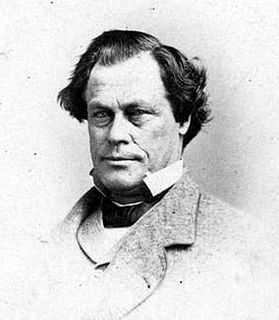
Owen Lovejoy was an American lawyer, Congregational minister, abolitionist, and Republican congressman from Illinois. He was also a "conductor" on the Underground Railroad. After his brother Elijah Lovejoy was murdered in November 1837 by pro-slavery forces, Owen, a friend of Abraham Lincoln, became a leader of abolitionists in Illinois, condemning slavery and assisting runaway slaves in escaping to freedom.
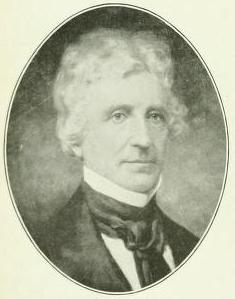
Harmar Denny was an American businessman and Anti-Masonic member of the U.S. House of Representatives from Pennsylvania.

Jonathan Blanchard was an American pastor, educator, social reformer, and abolitionist. Born in Vermont, Blanchard attended Middlebury College before accepting a teaching position in New York. In 1834, he left to study at Andover Theological Seminary, but departed in 1836 after the college rejected agents from the American Anti-Slavery Society. Blanchard joined the group as one of Theodore Dwight Weld's "seventy" and preached in favor of abolition in southern Pennsylvania.

The Boston Vigilance Committee (1841-1861) was an abolitionist organization formed in Boston, Massachusetts, to protect escaped slaves from being kidnapped and returned to slavery in the South. The Committee aided hundreds of escapees, most of whom arrived as stowaways on coastal trading vessels and stayed a short time before moving on to Canada or England. Notably, members of the Committee provided legal and other aid to George Latimer, Ellen and William Craft, Shadrach Minkins, Thomas Sims, and Anthony Burns.
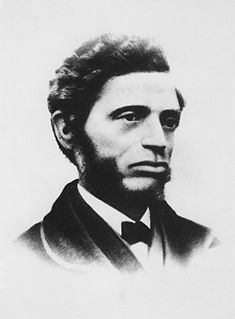
William Cooper Nell was an African-American abolitionist, journalist, publisher, author, and civil servant of Boston, Massachusetts, who worked for integration of schools and public facilities in the state. Writing for abolitionist newspapers The Liberator and The North Star, he helped publicize the anti-slavery cause. He published the North Star from 1847 to 18xx, moving temporarily to Rochester, New York.

Rev. Joshua Leavitt was an American Congregationalist minister and former lawyer who became a prominent writer, editor and publisher of abolitionist literature. He was also a spokesman for the Liberty Party and a prominent campaigner for cheap postage. Leavitt served as editor of The Emancipator, The New York Independent, The New York Evangelist, and other periodicals. He was the first secretary of the American Temperance Society and co-founder of the New York City Anti-Slavery Society.

The Daniel Howell Hise House is an historic home that was part of the Underground Railroad. It is listed on the National Register of Historic Places and is located in Salem, Ohio.

Francis Jackson (1789–1861) was an abolitionist in Boston, Massachusetts. He was affiliated with the Massachusetts Anti-Slavery Society, the Boston Female Anti-Slavery Society, the American Anti-Slavery Society and the Boston Vigilance Committee. He also worked for the South Cove Corporation, filling in land in Boston's South End in the 1830s.

Charles Turner Torrey was a leading American abolitionist. Although largely lost to historians until recently, Torrey pushed the abolitionist movement to more political and aggressive strategies, including setting up one of the first highly organized lines for the Underground Railroad and personally freeing approximately 400 slaves. Torrey also worked closely with free blacks, thus becoming one of the first to consider them partners. John Brown cited Torrey as one of the three abolitionists he looked to as models for his own efforts.

John Telemachus Hilton was an African-American abolitionist who established barber, furniture dealer and employment agency businesses. He was a Prince Hall Mason and established the Prince Hall National Grand Lodge of North America and served as its first National Grand Master for ten years. He also was a founding member of the Massachusetts General Colored Association, and active member and author in the Anti-Slavery movement.

Sheldon Peck was an American folk artist, conductor on the Underground Railroad, and social activist. Peck's portraiture – with its distinctive style — is a prime example of 19th century American folk art. He also become known for advocating abolitionism, racial equality, temperance, public education, women's rights, and pacifism.
Brig. Gen. James Appleton was an American abolitionist, early supporter of temperance, and politician from Maine.
